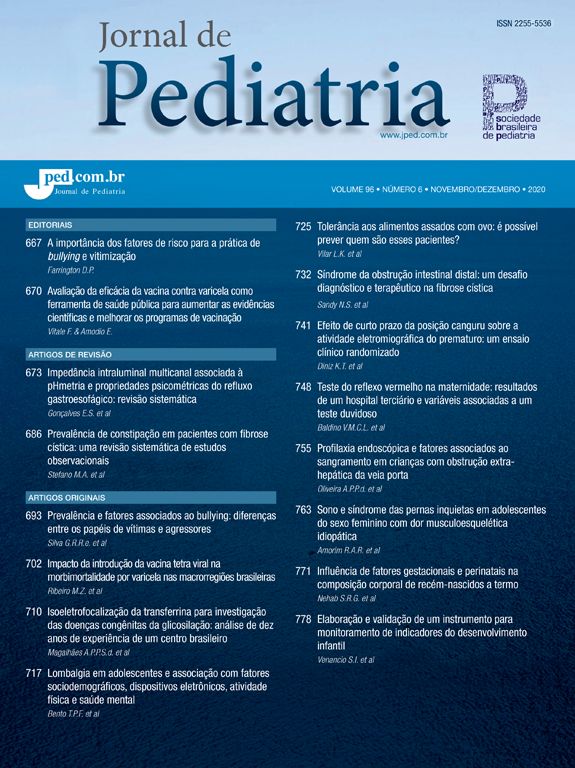To examine the cognitive development of school-aged children born preterm and with very low birthweight.
MethodsA cohort of premature infants born between January, 1991, and September, 1993 was examined at pre-school age. All of them were born in a public Neonatal Intensive Care Unit, with birth weight less than 1,500g. The WPPSI-R Test was used for cognitive evaluation and applied by psychologists. Babies with malformations, genetic syndromes, congenital infections, transferred from other institutions or born at home, and those with conditions which precluded the application of the test were excluded. A group of pre-school children in the same city, born at term, were tested for comparison.
Results79 children were studied, with mean birthweight 1,219.6 g (±168.9); of these, 44 (72.1%) attended school. No significant statistical difference was found between the groups (study and loss). The WPPSI-R Test mean scores were: 75.6±11.9 (total); 77±12.9 (performance) and 78.6±11.1 (verbal) for the study group, and 85.1±13.2 (total); 85.3±13.8 (performance) and 87.7±13.9 (verbal) for the comparison group. This difference was significant for total (p < 0.0001), verbal (p < 0.0001) and performance scores (p = 0.002), as well as for the subtests of the WPPSI-R Test.
ConclusionChildren who entered this study had a borderline intellectual functioning at the moment of the evaluation. Results indicate that they may face learning difficulties at school, thus requiring adequate stimuli that should be provided by the family and the school.
Avaliar o desenvolvimento cognitivo na idade pré-escolar de recém-nascidos prematuros de muito baixo peso.
MetodologiaUma coorte de prematuros nascidos entre janeiro de 1991 e setembro de 1993, com peso igual ou menor que 1.500 g, egressos de uma unidade de terapia intensiva neonatal pública, foi avaliada na idade pré-escolar pelo teste WPPSI-R, aplicado por psicólogas. Foram excluídas crianças com malformações, síndromes genéticas ou infecção congênita, transferidas de outra instituição, nascidas de parto domiciliar e com condições que impedissem a aplicação do teste. Avaliaram-se crianças pré-escolares de uma escola na mesma cidade, nascidas a termo, para comparação.
ResultadosForam estudados 79/129 crianças, com peso de nascimento médio de 1.219,6 g ( 168,9); 44/61 delas (72,1%) estavam na escola. Não houve diferença estatisticamente significativa entre os grupos (estudo e perda). As médias dos escores obtidos pelas crianças do estudo foram: total - 75,6 11,9; executivo - 77 12,9; e verbal - 78,6 11,1. Nas crianças da escola, as médias foram: total - 85,1 13,2; executivo - 85,3 13,8; e verbal - 87,7 13,9. Essa diferença foi significativa tanto para os escores total (p < 0,0001), verbal (p < 0,0001) e executivo (p = 0,002), como para os subtestes do teste WPPSI-R.
ConclusãoAs crianças do estudo apresentavam funcionamento intelectual limítrofe no momento da avaliação. Os resultados indicam possível dificuldade escolar, reforçando a necessidade de se prover estimulação adequada à criança, envolvendo a família e a escola.








